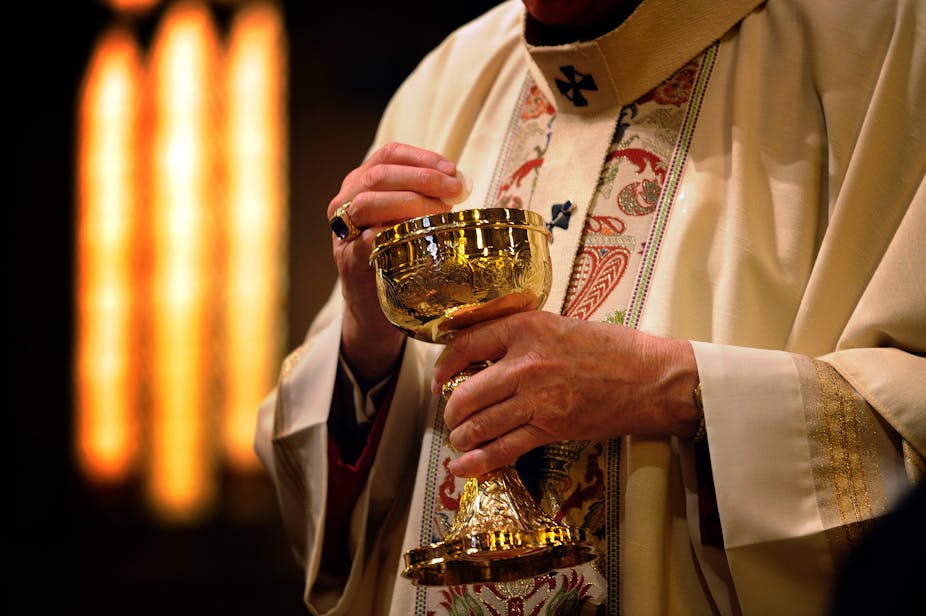Yes, Tony Abbott is right. There is something unattractive about a university allowing public meetings at which attendees are segregated by sex.
But hang on a moment: is this not the normal arrangement in Orthodox Jewish services? And does Abbott not belong to the Catholic Church, which debars women from high clerical office? Why was he not indignant that the recent election of the pope was by an electorate composed entirely of men?
Most organised religions privilege men over women, and almost all of them privilege heterosexual relations over homosexual ones. Even our atheist prime minister seems quite unconcerned that we fund a large scale school chaplain program which is run by Christian groups which are often sexist and certainly homophobic.
It is true that it is far easier today to criticise the excesses of Islam than those of Christianity, but what critics like Abbott carefully evade is the ways in which religious fundamentalists of all kinds share common attitudes towards sex and gender.
Currently in Sri Lanka there is a vicious campaign being waged against Muslims by devout Buddhists, who have successfully sold many westerners the idea that theirs is a religion of peace and love, despite the recent history of Buddhists in Sri Lanka and Cambodia. Neither party wishes to discuss this because it might undermine their pathetic attempts to persuade us that no one in Sri Lanka has reason to fear persecution.
In a predominantly white and nominally Christian country like Australia it is easy to understand why people are so ready to see “Islamophobia” in any criticism of the worst excesses of Islam. But religion is not equivalent to race: it is deeply racist — and unacceptable — to assume common characteristics to people based on their racial origins, which is unfortunately the language often used in discussing asylum seekers.
Religion, however, is a set of beliefs that people can either reject or accept, and in a democratic society it should be acceptable to point to it as the basis of a great deal of prejudice and discrimination. What is unacceptable is that people like Abbott ignore the behaviours of his own religion and concentrate on attacking Muslims because this plays well in the current political environment.
Very few politicians are brave enough to ask whether there are basic contradictions between the values of an open democratic society and those of almost all fundamentalist religions, in which I include the Catholic Church and many of the fast growing evangelical Christian denominations. As soon as religions start trying to impose their views on non-believers they have crossed the line that makes a truly democratic and liberal society possible, but while this is seized upon where Muslims are concerned it is largely ignored when Christians do the same.
Defenders of Abbott will presumably claim that Australia is a majority Christian country, and in terms of nominal affiliation this is probably still true. But the essence of rights in a democratic society is that it protects minorities from the views of the majority being imposed on them in the name of morality; thus we can agree that murder and rape are crimes, not because the Bible or other holy books says so, but because of a basic respect for human rights and dignity.
Of course moral choices have to be made in politics, and there are issues where politicians should not be bound by party policies. Although there is no sensible argument as to why same-sex marriage should be a matter of conscience for Labor parliamentarians, when issues of how we treat asylum seekers or live animal exports are not. But in a society that does not allow for an official religion moral arguments need more than religious prejudices to back them up.
I would be far less troubled by the media’s constant critique of Muslim excesses — and there are many — were there an equal willingness to ask hard questions about other religious practices. The recent election of Pope Francis was treated by the media as an exercise in celebrity worship, in which his murky history at the time of the Argentinian junta was barely mentioned.
Most Australians are instinctively secular, and even many who are church goers accept that idea that their views should not be imposed on others. Of course people have equal rights in arguing for their positions, but in doing so a secular society should not privilege one set of beliefs over another. Nor should we tolerate the hypocrisy of a practising Catholic attacking Muslims for sexism, when the entire governance of his church is based on the exclusion of women from positions of power.
Conservatives are fond of reminding us that with rights come responsibilities. The right to freedom of religion carries with it the obligation not to impose those views on others, and the willingness to engage in debate that does not rely on ancient texts as their justification.

